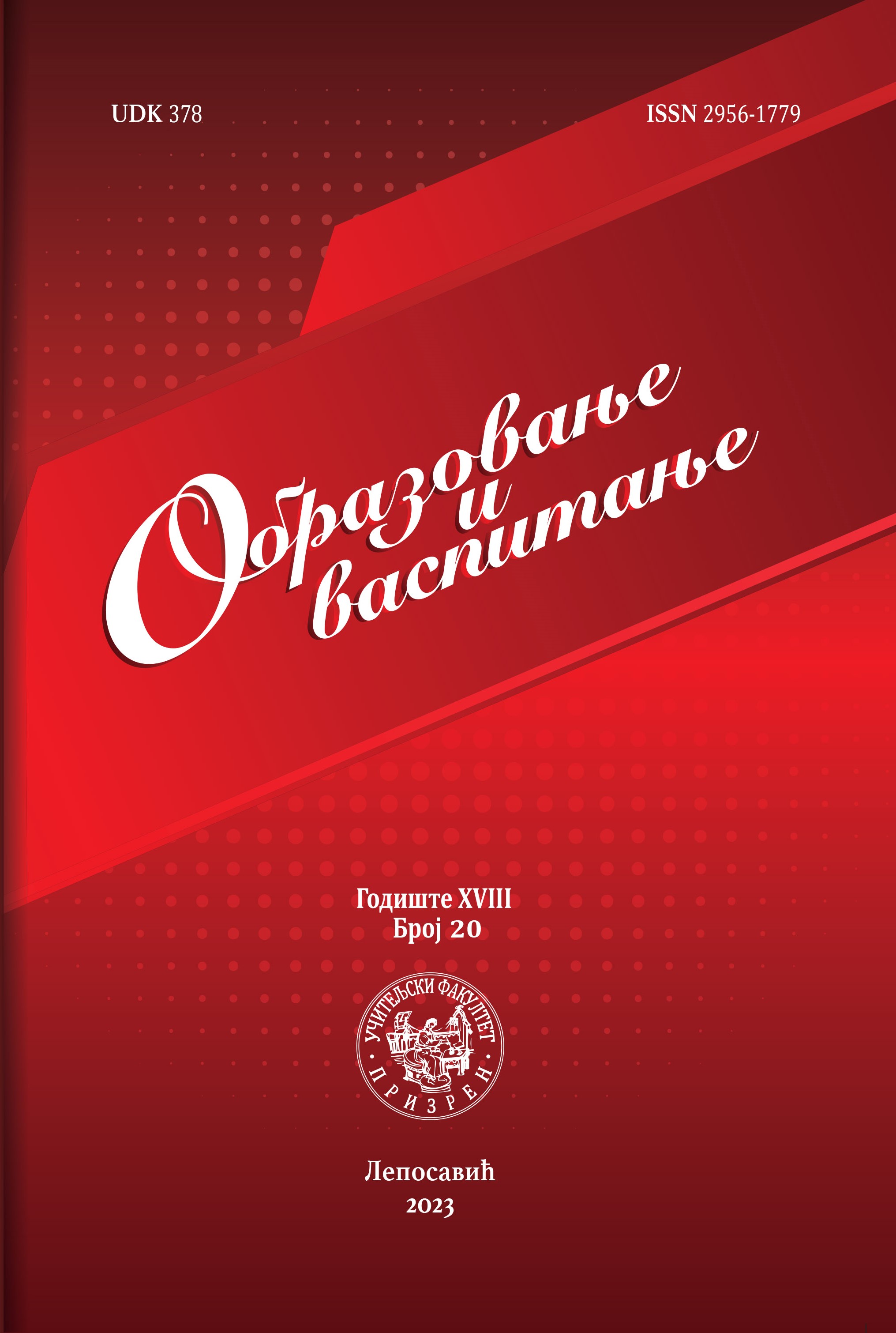Изградња математичких концепата коришћењем дидактичких игара у окружењу обогаћеном ГеоГебром
Sažetak
У овом истраживању испитујемо ефекте употребе софтвера GeoGebra у организовању наставног окружења заснованог на дидактичким играма, као и његов утицај на начин изградње и разумевање концета разломака код ученика. Процес учења/наставе је организован у двема групама ученика старости 9 до 10 година. Експерименталној групи су понуђени GeoGebra радни листови и процес учења је био заснован на њима. Ученици контролне групе су учили исту наставну материју на традиционалнији начин. Процену разумевања концепата код ученика смо извели коришћењем резултата редовних тестова које су ученици обавили у истом окружењу у ком су и радили. Према добијеним резултатима, ученици експерименталне групе показали боље разумевање концепата, а разлика је и статистички значајна. Ово указује да GeoGebra у комбинацији са учењем заснованим на игри може допринети бољим резултатима у изградњи концепта и разумевању разломака у почетним стадијумима учења.
Reference
Arbain, N. and Shukor, N. (2015). The effects of GeoGebra on students’ achievements, Procedia Social and Behavioral Sciences, 172, 208–214.
Attard, C. (2013). “If I had to pick any subject, it wouldn’t be maths”: Foundations for engagement with mathematics during the middle years. Mathematics Education Research Journal, 25, 569 – 587.
Bahrami, F., Rahimi Chegini, Z., Kianzadeh, A., Emami, F., and Abdi, H. (2012). A comparison of the effectiveness of game-based and traditional teaching on learning and retention of first grade math concepts, European Journal of Experimental Biology 2(6), 2099 – 2102.
Brown, R. (2010). Does the introduction of the graphics calculator into system-wide examinations lead to change in the types of mathematical skills tested?Educational Studies in Mathematics, 73 (2), 181–203.
Cheeseman, J. (2009). Challenging Children to Think: Teacher behaviours that stimulate children to examine their mathematical thinking. In J. Novotna and H. Moarova (Eds.) Proceedings in the International Symposium Elementary Maths Teaching: Development of Mathematical Understanding, 11 – 23. Prague: Charles University.
Drijvers, P. (2012). Digital Technology in Mathematis Education: Why it works (or it doesn’t). 12th International Congress of Mathematics Education, Coex, Seol, Korea.
Ernest, P. (1986). Games. A rationale for their use in the teaching of mathematics in school, Mathematics in School 15 (1), 2 – 5.
Flowerday, T., Schraw, G., and Stevens, J. (2004). The role of choice and interest in reader engagement. The Journal of Experimental Education, 72, 93 – 115.
Heid, M. K. (1998). Resequencing skills and concepts in applied calculus using the computer as a tool. Journal for Research in Mathematics Education, 19, 3 – 25.
Hohenwarter M, Hohenwarter J, Kreis Y, Lavicza, Z. (2008). Teaching and learning Calculus with free dynamic Mathematics software GeoGebra. Proceeding of International Conference in Mathematics Education 2008. Monterrey, Mexico.
Hopper, S. (2009). The effect of technology use on Student interest and understanding in Geometry, Studies in Teaching, Research Digest, 37–42.
Kokerić, M., Kreculj, D., and Vešović, R. (2016). Informatika u programiranoj nastavi matematike za učenike mlađih razreda osnovne škole. Zbornik radova Učiteljskog fakulteta Prizren – Leposavić, 10, 175 – 183.
Ku, O., Chen, S. Y., Wu, D. H., Lao, A. C. C., and Chan, T. W. (2014). The effects of game-based learning on mathematical confidence: High ability versus low ability. Educational Technology and Society, 17(3), 65 – 78.
Lim, K. C., and Leong, K. E. (2016). A study of gamification on GeoGebra for remedial pupils in primary mathematics. Proceedings of the 21st Asian Conference on Technology in Mathematics, Pataya, Thailand, 222 – 228.
Ljajko, E. and Ibro, V. (2013). Development of Ideas in a GeoGebra – aided mathematics instruction, Mevlana International Journal of Education (MIJE) 3(3),Special Issue: Dynamic and Interactive Mathematics Learning Environments, pp. 1- 7.
Ljajko, E. (2018). GeoGebra as a tool in building two- and three-digit whole numbers, Proceedings of Scientific Conference Language, culture and education, pp. 651 – 662, Užice, Serbia.
Maričić, S. M, and Milinković, N. S. (2022). Spremnost učitelja za onlajn nastavu matematike tokom pandemije COVID-19. Zbornik radova Učiteljskog fakulteta Prizren – Leposavić, 18, 113 – 128.
Martin, A. J. (2007). Examining a multidimensional of student motivation and engagement using a construct validation approach. British Journal of Educational Psychology, 77 (2), 413 – 440.
Martin, A. J., Way, Y., Bobis, J., and Anderson, J. (2015). Exploring ups and downs of mathematics engagement in the middle years of the school. Journal of the Early Adolescence, 35(2), 199 – 244.
Martinovic, D., and Karadag, Z. (2012). Dynamic and interactive mathematics learning environments: the case of teaching limit concept. Teaching mathematics and its applications, 31(1), 41 – 48.
Oblinger, D., and Oblinger, J. (2005). Is it Age or IT: First steps towards understanding the net generation? In: D. Oblinger and J. Oblinger Eds., Educating the Net Generation.(2.1-2.20).Boulder, CO: EDUCAUSE.
Okur, M., and Aygenc, E. (2018). Video games as teaching and learning tool for environmental and space design. Eurasia Journal of Mathematics, Science and Technology Education, 14(3), 977 – 985.
Polycarpou, I., Krause, J., Rader, C., Kembel, C., Poupore, C., and Chiu, E. (2010). Math-City: an educational game for K-12 mathematics, Procedia Social and Behavioral Sciences 9, 845 – 850.
Prensky, M. (2001). Digital game based learning. New York: McGraw-Hill.
Tokac, U., Novak, E., and Thompson, C. G. (2019). Effects of game-based learning on students’ mathematics achievement: A meta analysis. Journal of Computer Assisted Learning, 35(3), 407 – 420.
Umbara, U., Munir, R., Susilana, E. F., and Puadi, W. (2021). Algebra dominoes game: Re-designing mathematics learning during the covid-19 pandemic, International Journal of Instruction 14(4), 483 – 502.

